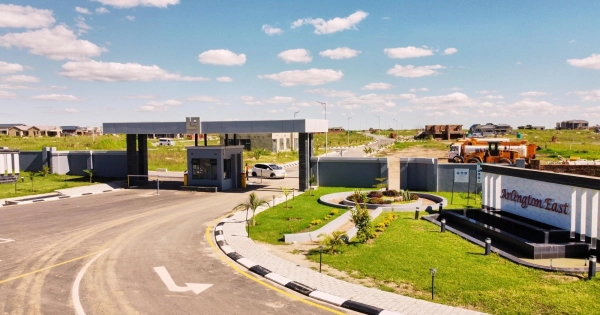Are you tired of paying rent but feel that buying a full house is just too much right now? Considering how inflated Zimbabwe's property market is, this is a completely understandable position to take. That's why "Stand" might be the most popular and positive Zimbabwean word there is. Many Zimbabweans are turning to stand purchases as their first step into property ownership. But "Stand" is also a word fraught with danger. Whether you're looking for a residential stand in Harare or a commercial stand in Bindura, this guide will walk you through everything you need to know.
As Zimbabwe's leading property marketplace with over 8,000 listings across 80 cities and regions, Propertybook has helped thousands of first-time stand buyers find their perfect piece of land. Let's dive into what you need to know before putting down your hard-earned money on a stand.
Why Buy a Stand in Zimbabwe Right Now?
With the national housing backlog hitting over 1 million, buying a stand and developing it gradually has become the most realistic path to homeownership for many Zimbabweans. The average stand price nationwide sits at $110,000, but prices vary significantly depending on location:
- Harare: $123,000 average (about $53 per square meter)
- Mashonaland East: $55,000 average (about $38 per square meter)
These prices might seem high, but with over 1,456 stands available across the country valued at approximately $159 million, you have options to fit different budgets.
Step-by-Step Process to Buying Your Stand
Step 1: Know What You're Looking For
Before you start scrolling through listings, ask yourself:
- Do you want a residential or commercial stand?
- What location works best for your needs?
- What size stand do you need?
- What's your budget (including taxes and fees)?
- Do you need serviced land with water and electricity connections?
Your honest answers will save you time, money, and heartache down the road.
Step 2: Research Areas and Prices
Different areas come with vastly different price tags. A stand in Harare's northern suburbs might cost three times more than a similar-sized plot in Norton or Ruwa.
When comparing locations, consider:
- Distance to your workplace
- Access to schools, hospitals, and shops
- Public transport options
- Security situation
- Likelihood of value appreciation
Don't just rely on agent descriptions. Visit the actual location at different times of day to get a real feel for the area.
Step 3: Verify the Seller's Legal Standing
This step might not be exciting, but it's where many Zimbabweans get burned. It's common for people to buy stands, build up their houses and then see them knocked down in a year when it becomes apparent that their building is actually illegal. Before paying a single dollar, verify:
- The seller's identity and legal right to sell
- That the stand actually exists (yes, really!)
- That the stand boundaries match what's being advertised
At Propertybook, we've seen too many cases where buyers discover they've purchased a non-existent stand or one that was sold to multiple people. This is especially common with "agents" operating solely through Facebook or WhatsApp.
Step 4: Check Essential Documentation
Never proceed without verifying these documents:
- Subdivision Permit: Confirms the land can be legally subdivided
- Development Permit: Shows that construction is allowed
- Certificate of Compliance: Verifies that all council requirements have been met
- Title Deed or Offer Letter: Legal proof of ownership
If the seller can't produce these documents, walk away no matter how good the deal seems. For more information on property documentation, check our article on Beware of Title Deed Fraudsters.
Step 5: Understand Zoning Regulations
A stand might seem perfect until you discover you can't build what you want on it. Zimbabwe's urban councils have specific zoning regulations that determine:
- What type of structure you can build (residential, commercial, industrial)
- Maximum building height
- How much of the stand can be covered by buildings
- Minimum distance from boundaries
- Required parking spaces
These regulations vary by council and neighborhood, so always check with the local planning authority before purchasing.
Step 6: Assess Infrastructure and Utilities
In Zimbabwe, not all stands come with ready access to:
- Clean water
- Electricity
- Sewage systems
- Tarred roads
- Street lighting
Serviced stands (with utilities already connected) cost more upfront but save you the headache and expense of arranging these services yourself. Unserviced stands might seem cheaper initially but can end up costing more in the long run.
Many developers promise to install services "soon" but take years to deliver. Check if neighbouring stands already have these services as a reality check.
Step 7: Get Financing in Order
Most stand purchases in Zimbabwe are cash transactions, but financing options do exist:
- Bank Loans: Several Zimbabwean banks offer land loans with varying terms
- Mortgage Bonds: Some developers partner with financial institutions
- Developer Payment Plans: Many developers offer 6-24 month payment terms
- Private Lenders: Higher interest rates but more flexible requirements
Whatever your financing method, get pre-approval before shopping to know your exact budget.
Step 8: Negotiate the Deal
Don't accept the first asking price. In Zimbabwe's current market, most sellers expect some negotiation. Consider:
- How long has the stand been on the market?
- Are similar stands selling for less?
- Does the stand have any drawbacks (odd shape, flooding issues, etc.)?
- Is the seller in a hurry?
A skilled negotiator can often shave 10-15% off the asking price, especially for private sales.
Step 9: Conduct a Site Visit and Survey
Never buy a stand sight unseen. During your visit:
- Walk the entire perimeter
- Look for boundary markers
- Check for drainage issues
- Note any obstacles to construction
- Observe neighbouring properties
- Test mobile network coverage
Consider hiring a surveyor to confirm the exact dimensions and boundaries match what's being sold.
Step 10: Complete Legal Transfer
This is where many buyers cut corners, only to regret it later. The full legal transfer process includes:
- Drafting and signing an agreement of sale
- Payment of capital gains tax (by the seller)
- Payment of stamp duty (by the buyer)
- Transfer of title deed or offer letter
- Registration with the Deeds Office
For more information on the latest fees involved, read our article on New Conveyancing Fees for Zimbabwe.
Common Pitfalls to Avoid
Falling for Too-Good-To-Be-True Deals
If the price is significantly below market value, there's usually a catch. Common scams include:
- Selling stands in areas without approved layouts
- Selling land without legal ownership
- Double-selling the same stand to multiple buyers
- Selling stands with disputed ownership
Remember that the average stand price nationwide is $110,000, with Harare averaging $123,000. Anything drastically below these figures deserves extra scrutiny.
Skipping Due Diligence
Taking shortcuts on verification can lead to years of legal battles. Always:
- Check the seller's ID against the title deed name
- Verify all documents with the issuing authorities
- Search for any encumbrances or liens on the property
- Confirm that rates and taxes are paid up
Ignoring Future Development Plans
That peaceful area might not stay peaceful for long. Check with the local council about:
- Planned roads or highways
- Commercial developments
- Industrial zones
- Changes to infrastructure
A stand that's cheap today might be cheap because someone knows something you don't about future developments that could affect its value.
Overlooking Total Costs
The purchase price is just the beginning. Budget for:
- Legal fees (3-5% of purchase price)
- Stamp duty (1-4% depending on value)
- Survey fees (if required)
- Connection fees for utilities
- Road and drainage contributions
- Fencing costs
- Land preparation for construction
These "extras" can add 10-20% to your total investment.
Finding the Right Stand in Zimbabwe
With over 1,456 stands available nationwide, finding the right one can feel overwhelming. At PropertyBook, our database includes stands across all major cities and regions:
- Residential stands in Harare
- Commercial plots in Bulawayo
- Developing areas in Norton and Ruwa
- Rural and peri-urban options nationwide
Our network of 2,000+ verified agents can help you find options that match your specific requirements, with no risk of fraudulent listings.
Final Tips and Advice
Buying a stand is often the first step in a longer journey toward building your dream home or business premises. While it might seem complicated, taking your time and following these steps will help protect what might be one of the largest investments you'll ever make.
Remember that the Zimbabwean property market has its unique challenges, but with proper guidance and due diligence, stand ownership can be both achievable and rewarding.
Ready to start your search? Visit www.propertybook.co.zw to browse our current stand listings across Zimbabwe.
Data Note: All pricing and availability information was accurate as of April 2025, based on Propertybook's database of over 8,000 properties across Zimbabwe.





